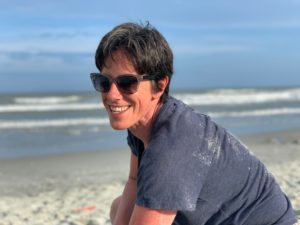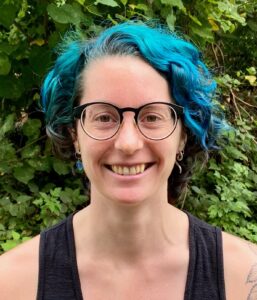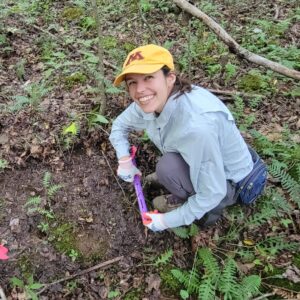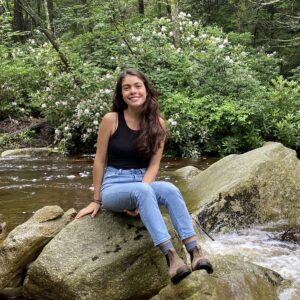Jennifer Lau
 I am an evolutionary ecologist interested in understanding the full range of ways that plant populations respond to changing environmental conditions. Much of my work focuses on how rapid environmental changes (e.g., biological invasions, rising CO2 concentrations, and global climate change) impact population dynamics, species interactions, and the evolution of plant populations.
I am an evolutionary ecologist interested in understanding the full range of ways that plant populations respond to changing environmental conditions. Much of my work focuses on how rapid environmental changes (e.g., biological invasions, rising CO2 concentrations, and global climate change) impact population dynamics, species interactions, and the evolution of plant populations.
Graduate Students:
Mackenzie Caple

Mackenzie received her BS in Plant Biology from the University of Michigan. Her research concerns the ecology and evolution of plant-microbe interactions, with a focus on how elevated soil nitrogen affects the mutualism between legumes and rhizobium bacteria. See Mackenzie’s CV.
Emma Boehm

Emma received her Bachelor of Science from University of Minnesota where she double majored in Ecology, Evolution, and Behavior & Plant and Microbial Biology. She has received a prestigious NSF Graduate Research Fellowship. Emma is currently studying rapid adaptation including the role of epigenetics and plasticity. See Emma’s CV.
Sierra Pérez
 Sierra received her BA in Geology from Bryn Mawr College and her MS in Ecology, Evolution, and Conservation Biology from University of Illinois, Urbana-Champaign. Her research explores the factors influencing the resilience of plant populations and communities to ongoing global changes. See Sierra’s CV.
Sierra received her BA in Geology from Bryn Mawr College and her MS in Ecology, Evolution, and Conservation Biology from University of Illinois, Urbana-Champaign. Her research explores the factors influencing the resilience of plant populations and communities to ongoing global changes. See Sierra’s CV.
Thomas Zambiasi
 Thomas received his Bachelor of Science in Plant Biology from Michigan State University. He is interested in plant community ecology in the context of climate change, biotic homogenization, and the relationship between biodiversity and community stability. See Thomas’ CV.
Thomas received his Bachelor of Science in Plant Biology from Michigan State University. He is interested in plant community ecology in the context of climate change, biotic homogenization, and the relationship between biodiversity and community stability. See Thomas’ CV.
Bryan Guevara
 Bryan received his BS in Biology from The University of Iowa. He is interested in understanding the role climate changes plays in plant and herbivore interactions. Bryan plans to work extensively to promote DEI programs and initiatives. See Bryan’s CV
Bryan received his BS in Biology from The University of Iowa. He is interested in understanding the role climate changes plays in plant and herbivore interactions. Bryan plans to work extensively to promote DEI programs and initiatives. See Bryan’s CV
Others in the Lab:
- Jordan Ziss is a full-time technician in the lab.
- Mark Hammond is a long-term technician in the lab based at Kellogg Biological Station, where he keeps everything running.
Former Grad Students:
Susan Magnoli
Susan completed her Ph.D. Winter 2018 and moved on to a USDA NIFA funded post doc in Jim Beaver’s lab at the University of Kansas. For her Ph.D., Susan investigated the role of rapid adaptation in ecological restorations.
Meredith Zettlemoyer
Meredith completed her Ph.D. in Summer 2020 and is currently a post doc in Megan Peterson’s lab at University of Georgia. For her Ph.D. Meredith used huge field experiments to investigate the causes of local extinctions.
Tomomi Suwa
Tomomi Suwa is now a Data Scientist at The Field Museum. For her Ph.D., Tomomi investigated how rhizobium mutualists can facilitate plant adaptation to soil moisture.
Tyler Bassett
Tyler is currently a Conservation Associate at the Michigan Natural Features Inventory. Tyler is a well known Michigan botanist and studied the effects of species diversity on stability, invasion resistance, and ecosystem functions in restored prairies for his Ph.D.
Kane Keller
Kane completed his PhD in Summer 2016, went on to a postdoc at the University of Minnesota, and is now an Assistant Professor at Cal State University, Bakersfield. Kane is a community ecologist studying how mutualisms and other symbioses influence plant community ecology.
Liz Schultheis
Liz completed her PhD in Summer 2016 and went on co-found DataNuggets, a popular educational tool that uses small authentic datasets to teach elementary through high school students how to answer questions with data and how to create and interpret graphs. She is now Education and Outreach Coordinator for the Long Term Ecological Research (LTER) program at the W.K. Kellogg Biological Station (KBS). You can read more about here work at https://ehschultheis.wordpress.com
Guillaume Dury
Guillaume received his M.Sc. in Plant Science, Neotropical Environment Option from McGill University and Smithsonian Tropical Research Institute. He is co-advised by Dr. Michael Wade and Dr. Jennifer Lau. He is studying the evolution within generational plasticity and transgenerational plasticity.
Lana Bolin
Lana received her Bachelor of Science from University of Minnesota where she double majored in Ecology, Evolution, and Behavior & Plant Biology. Lana has received a prestigious NSF Graduate Research Fellowship. She is currently studying how and why microbes can help plants adapt to environmental stress.
Former Post Docs:
Casey terHorst
Casey, a former postdoc, is now an Assistant Professor at Cal State Northridge, where he studies a wide variety of species interactions, including the legume-rhizobium mutualism and coral-symbiont mutualisms. He completed his Ph.D. at Florida State University with Tom Miller and Don Levitan. He is happy to be back at the same institution where he received his Master’s degree (with Steve Dudgeon). You can read more about Casey at his lab site.
Rachel Prunier
Rachel is an Adjunct Professor at UCLA. Previously, she was an Associate Professor at Western Connecticut State University. She studies the evolution of White Proteas, Desmodium-rhizobium mutualisms, and turtles.
Dylan Weese
Dylan is now an Associate Professor at Saint Ambrose University in Davenport, Iowa. He continues to study rapid evolutionary responses to nitrogen deposition in the legume-rhizobium mutualism, mentor undergraduate researchers, and fish.
Mia Howard
Mia is now a Collegiate Fellow at University of Michigan, where she studies how nitrogen-fixing bacteria (rhizobia) affect the evolution of cyanide production in clovers, and conversely, how cyanide production affects the evolution of mutualism. Mia received her Ph.D. from Cornell University where she studied how soil microbes affect the ecology and evolution of plant defenses over succession.
José Waterton
José received his Ph.D. in Biological Sciences from University of California, San Diego where his dissertation was on factors shaping the evolution of emergence timing and its community-level impacts in seasonal environments. Here at IU, José is using a long-term nitrogen addition experiment to test how nitrogen affects natural selection on plant traits and the opportunity for selection.